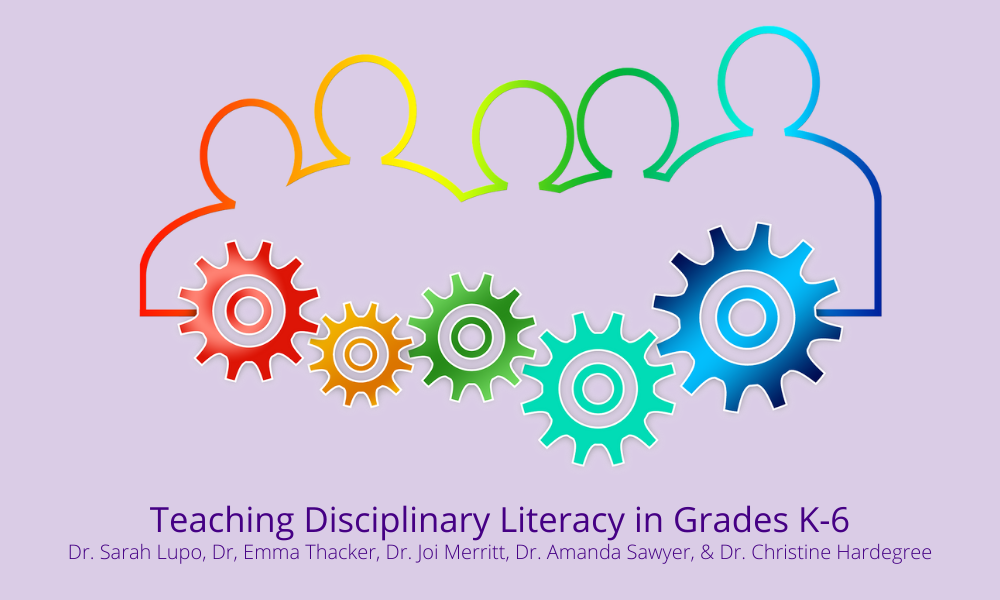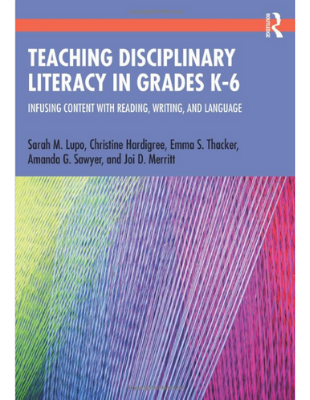Four College of Education Professors Collaborate to Publish a Book
College of Education
SUMMARY: Dr. Sarah Lupo, Dr. Emma Thacker, Dr. Joi Merritt, and Dr. Amanda Sawyer, all JMU professors in the College of Education, teamed with Dr. Christine Hardegree (Iona College), to write the book "Teaching Disciplinary Literacy in Grades K-6," which took them over a year to complete.
By Xixëllonjë Nebihu
For many people, the past year has been a unique one. Besides the pandemic, there have been other new experiences. Dr. Sarah Lupo (EERE), Dr. Emma Thacker (EERE), Dr. Joi Merritt (EERE), and Dr. Amanda Sawyer (MSME), all JMU professors in the College of Education, teamed with Dr. Christine Hardegree (Iona College), to write the book "Teaching Disciplinary Literacy in Grades K-6," which took them over a year to complete.
The book is divided into five sections, with authors from different fields contributing to each section. As Dr. Lupo explains, the book was conceived after struggling to find readings for her course on literacy throughout the curriculum. The collaboration emerged after Dr. Lupo asked her colleagues about demonstrating how literacy and subject areas overlap. Working with a vast author team is challenging but they managed it by creating a model content integration, establishing rules and deadlines, communicating, and providing feedback to one another.
The book's main goal is to make teaching more efficient. Dr. Lupo shares how this book has influenced her teaching. “It's a game-changer to have a textbook for this course. My students have said incredibly positive things about the book. I think it really made a big difference in my course; it also reduced the number of readings that my students did, which took the pressure off. And it just makes my course so much more cohesive when I'm teaching. It has had a huge impact on my teaching.”
The book has also had an impact on the lectures of the other professors. For instance, Dr. Merritt says, “It just opened up more ideas of things I could do with my students in preparation for what they are going to face later. Students can see the book in action; I do a lot of model teaching. Students hear the voices of their professors from here. This is the same thing they were talking about and showing in our classes.”
 Dr. Thacker has benefited from the book as well, stating that it has helped her in her educational endeavors. “I teach the unit planning class that’s taught in conjunction with the interdisciplinary literacy class for our ELED students before student teaching. While they focus on their literacy unit in Dr. Lupo’s class, knowing the text they’re using for that class so well helps me understand better what they’re working on. I’m able to work to make connections between their content-specific unit (which is the focus of my class) and their literacy unit (which is the focus of Dr. Lupo’s class).”
Dr. Thacker has benefited from the book as well, stating that it has helped her in her educational endeavors. “I teach the unit planning class that’s taught in conjunction with the interdisciplinary literacy class for our ELED students before student teaching. While they focus on their literacy unit in Dr. Lupo’s class, knowing the text they’re using for that class so well helps me understand better what they’re working on. I’m able to work to make connections between their content-specific unit (which is the focus of my class) and their literacy unit (which is the focus of Dr. Lupo’s class).”
This book is a valuable resource for students because it covers a wide range of subjects. The book itself ensures that when teaching literacy, the students are accurate in using the vocabulary. Dr. Amanda Sawyer, for example, integrates various components of writing, including oral language, communication, and common math misconceptions, while teaching mathematics.
When asked about the book’s impact, Dr. Sawyer reflects, “The main point is to make sure they understand what the real word meaning behind mathematics is because math is not magic. There is a valid reason why things work. And it's a manmade process.”
Dr. Christine Hardegree also speaks with us about her writing experience. “It really clarified my thinking about how to serve my students better. In getting fresh expertise, I learned so much, particularly from [Dr. Sawyer] about teaching math; in particular, the different kinds of pitfalls to avoid when approaching math literacy. So just getting the fresh perspectives from the content area experts helped me and particularly in my teaching, to serve my pre-service teachers better in this area.”
Each of them puts their scholarship and service-learning experience to scholarly use at JMU. As a result of this experience, they believe they have grown as scholars. Their perspectives on providing a variety of instructional approaches to the communities they serve have been shaped by the book.
